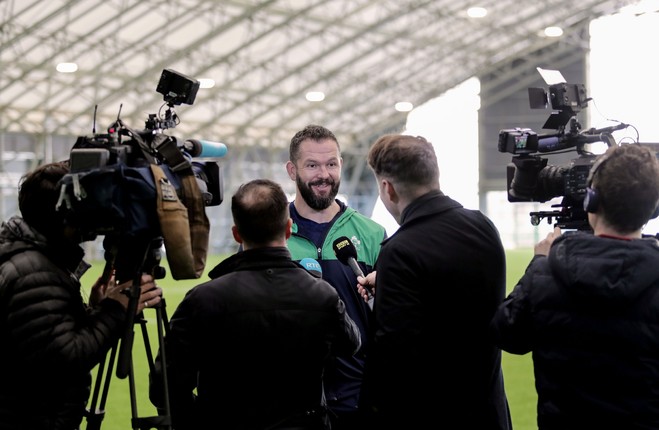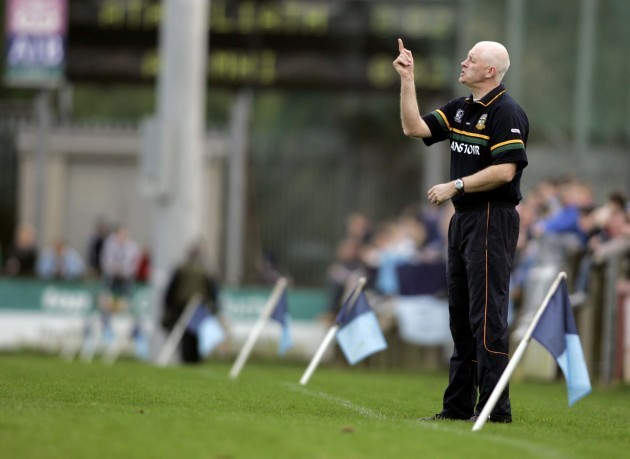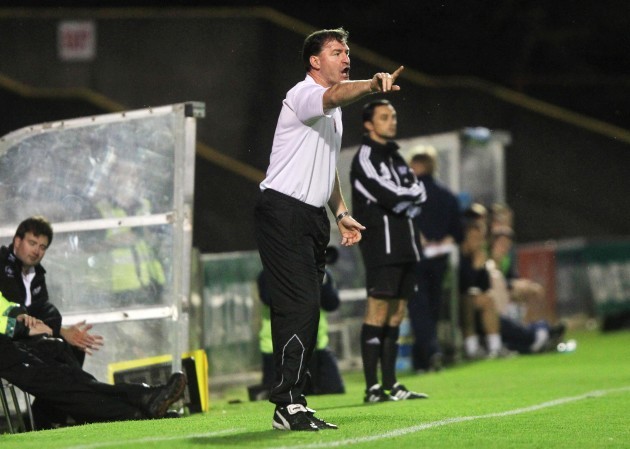TODAY WILL BE a strange day.
Is it seven years since someone other than Joe Schmidt took charge of an Ireland match in the Six Nations.
Step forward Andy Farrell.
Despite an underwhelming 2019 campaign, Ireland’s supporters – and players – have become accustomed to a certain level of success in recent years.
The Joe Schmidt way has been ingrained into this Ireland team.
Farrell, of course, was part of Schmidt’s set-up since 2016, but now he finds himself in his first job as a head coach looking to put his own stamp on the team that Joe built.
The achievements of Schmidt’s tenure still define this Ireland team, and initially, the comparisons with his predecessor will be difficult for Farrell to ignore.
He isn’t the first coach to find himself in this situation.
“There were times where I found it difficult filling Seán’s boots, because those comparisons were being made at times,” admits Eamonn Barry, who in late 2005 took over the Meath footballers after the curtain fell on Seán Boylan’s remarkable 23 year reign.
Boylan had delivered four All-Irelands, three Leagues and eight Leinster Championships, but that steady stream of trophies had started to dry up.
“It was just that the time had come for change,” Barry continues.
“Things had gone downhill a bit. Seán wasn’t getting the best out of the lads anymore. It was just a matter of freshening things up and trying something different.”
Sound familiar?
“I don’t think it’s going to be too difficult for Andy,” Barry says.
“He’s been there with Joe Schmidt for a while. He knows the scene inside out.
“It was disappointing the way it went pear-shaped with the World Cup, but he’s such a professional, I’m sure he knows what he wants to do, and he knows how to get the best out of players as well. He knows the standards he’s looking for, what level he wants the team to get back to and to get good performances consistently.”
Aaron Callaghan also knows what it is like to inherit a successful team, even if the circumstances surrounding his appointment as Bohemians manager was complicated by matters off the pitch.
Callaghan was announced as Bohemians’ new boss on New Year’s Eve, 2011.
A month earlier, Pat Fenlon had left for Hibernian after a four-year spell at Bohemians which saw him win two Premier Divisions and an FAI Cup.
Yet the club were in a bad way financially, and Callaghan found himself having to rebuild the team on a shoestring budget.
Getting them back on track was going to be a long-term project.
“The first thing for us to do was dampen down fans’ expectations,” Callaghan says.
“The survival of the club was the most important thing. The club was maybe two or three days away from the locks going on the door.
“So for me coming in, bringing in all these young players, one of the key aspects was to have a clear tactical plan in how I wanted the players to play, and what philosophy I was trying to introduce to that young team.
“The biggest key area for me was to find the right style of play, and I think that’s what Andy will try do.
“Will he adjust the style of play a lot compared to what Joe had? Is he going to try play a different system? He’ll have his own thoughts and views about that, and I think that my system and my style of play would have been totally different to what Pat had been doing.”
While Callaghan had a strong belief in the way his team would set up, it took a while for his players to settle into the new system. Results weren’t coming, and football fans aren’t renowned for their patience.
“We spent most of the pre-season having trials for young players, and that sort of knocked us back three or four weeks. With that in mind, we started off the season by losing three or four games in a row. Now, they were all tight games, we lost them all by one goal I think.
“So for those first four or five weeks fans were looking at it going ‘God, this is really glum,’ and it was and all doom, [people were] thinking we were going to go down.”
Farrell is tasked with hitting the ground running in this Six Nations despite only having a short period of time to work with his players.
Callaghan warns it can only take a couple of bad performances for things to get uncomfortable.
“What happens is the fans just go ‘This isn’t working,’ or ‘He’s not the right person,’ and they were a lonely few weeks for me and my backroom staff,” Callaghan remembers.
“I knew from experience it would take time.
“We kept doing the right things in training, and then it was about transferring that to the pitch. For some of the young players, it took them longer to adapt than normal, but I’d say by about the 10th or 11th week you could see a big change, and a big shift in our results.”
Barry met a similar dilemma.
While Boylan has brought huge success to Meath, by the time Barry came on board the county hadn’t won a Leinster Championship in five years.
Barry feels he found a team excited to hear a new voice.
“What players are really looking for is just a good set-up,” he explains.
“They want to be challenged all the time, and they want to try improve themselves individually. Professional sport is maybe different because it’s judged on success, but in loads of other sports, if the manager and the management team go in and improve things… If you can take things forward and improve players individually, then collectively the team improves as well and you’ll leave it in a better place.
“I’m sure Andy Farrell will have his own ideas on what needs to be done and how to change things around. You can’t just keep doing the same things over and over again and expecting everything to roll on.
“Players expect something different, and that’s what challenges them. Bringing in something different is more challenging and also more enjoyable for them. And that’s really important as well, it has to be enjoyable.”
Callaghan agrees, and feels Farrell will need to have come into the job with a clear idea of how he wants to evolve Ireland’s gameplan.
“I think players want a clear message on what he wants each player to do,” he says.
“I think sometimes, modern managers, particularly in soccer, can start off with one system, and then within that one system you have two or three systems which the team can transfer into. So a clear message on what the manager is looking for from each player in each position when they go out onto that pitch [is important]. And also a style of play that suits the players available to him at that particular time.
“If Andy brings in a couple of new young lads, and hands out a couple of debuts, there will obviously be a few changes [to the way the team plays] compared to what Joe would have had. Clear communication of what role and what responsibility they have within the team is the most important thing.”
Getting off to a winning start also helps.
“It’s about building confidence, and winning brings about that confidence,” Barry continues.
“If you bring good performances the result will always look after itself. That’s more or less the way you look at it. If you are getting the best out of the players and the team is performing, you can’t ask for any more than that.”
Like Farrell, Barry remembers coming into a team where success was almost expected.
Managing that expectation can prove to be difficult with a team in transition.
“Joe and Andy are operating with huge expectations,” he says.
“Joe’s success and achievements were absolutely fabulous, unbelievable. They maybe even over-performed and reached standards that nobody ever expected them to reach.
“It will be difficult for Andy to bring it back up to that level again. It might be unfair to say, but it can be a once in a lifetime achievement to reach that level with that bunch of players that Joe had. Whether Ireland can get a similar bunch of players back up to the level is questionable… Hopefully they can.”
Expectations were not quite as high for Callaghan’s Bohemians team.
After a rough start to the season, results eased out and Bohemians finished mid-table, and Callaghan still looks back fondly at memorable results along the way, including a 4-0 defeat of Stephen Kenny’s Shamrock Rovers at Dalymount Park.
“You’ll always find that supporters will be happy when the team is winning.
“Pat had a really really good team, and a really good budget to bring in top players. We were coming at it differently.
“The message was, ‘Look, we’re going to have to hang in here.’”
The job didn’t get any easier, and a frustrating winless run saw Callaghan removed from the job with the club a point from the bottom of the table in July 2013.
Barry’s Meath team looked on course for better things, and made a promising start by winning the O’Byrne Cup before a difficult League campaign saw them relegated on the final day of their Division 2 campaign on score difference.
A decent run through the All-Ireland qualifiers wasn’t enough to keep Barry in the job, and he was ousted after just one year in charge.
Still, he too holds fond memories, and for all the pressure that comes with the top job, he says Farrell should make an effort to enjoy his new position.
“It’s great to test yourself at that level,” he says.
“To get up to that level and be able to test yourself, and to be over the best players in your county or your country, there’s a great buzz in that.
“Yes, it’s a huge task, but it’s also an enjoyable task.”
After all, you never know how long it’s going to last.
Take it from those who know.
The big Six Nations preview with Andy Dunne, Murray Kinsella and Gavan Casey
The42 Rugby Weekly / SoundCloud



